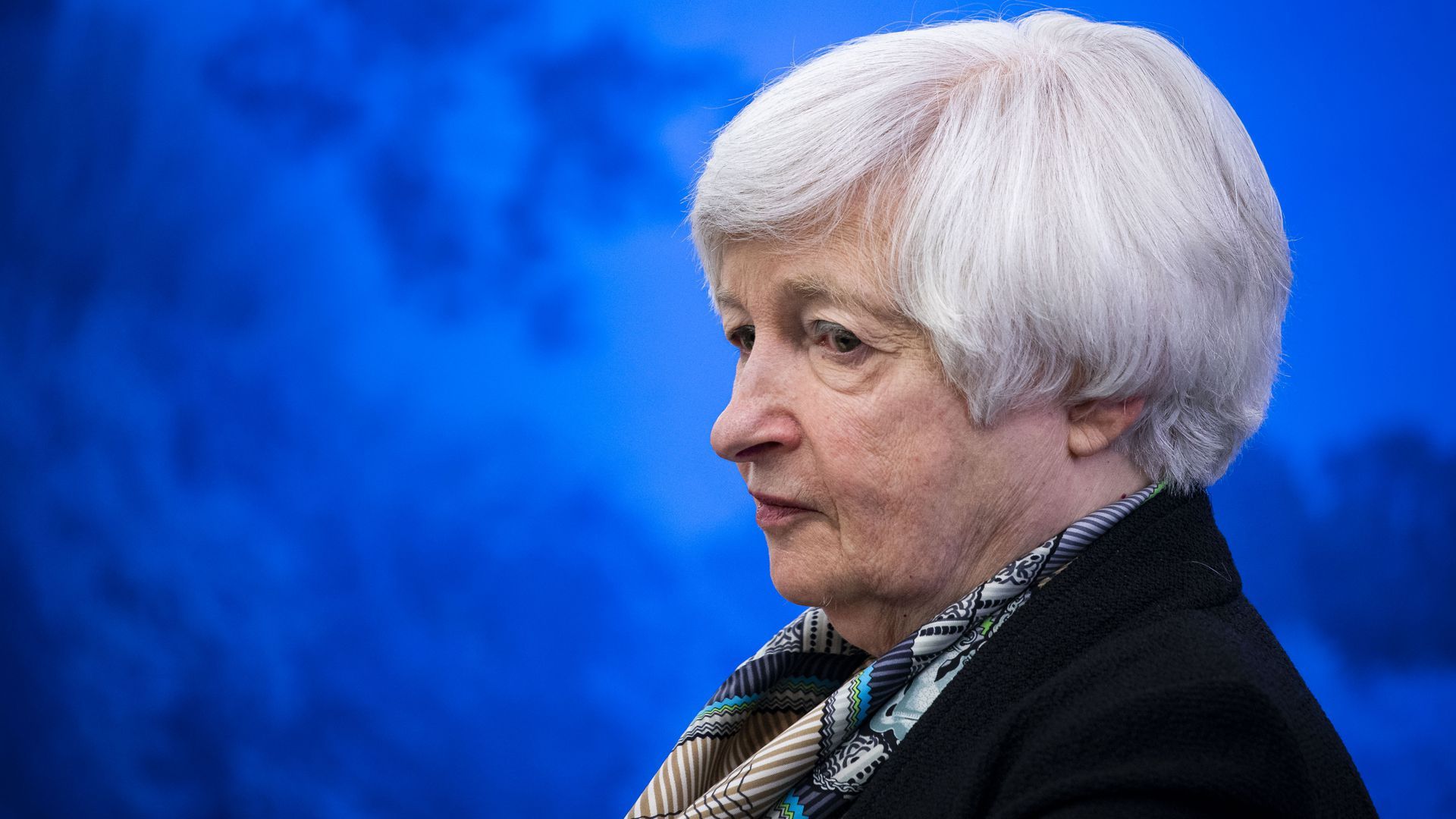| | | | | | | Presented By Ripple | | | | Axios Markets | | By Matt Phillips and Emily Peck · Apr 20, 2022 | | 🌅 🐪 hi! It's 420, but we're quite sober today. There are big problems in need of solving. Plus, real estate news. Let's get into it, shall we? P.S. Cannabis prices are bucking inflation. Today's newsletter is 1,125 words, 4.5 minutes. | | | | | | 1 big thing: Finance ministers face problems they can't solve |  | | | Treasury Secretary Janet Yellen last week. Photo: Al Drago/Getty Images | | | | Every April, the world's finance ministers and other economic policy leaders descend on Washington for the spring meetings of the International Monetary Fund and World Bank. - Things feel different this year — and not just because D.C. has had a stubbornly late-arriving spring, Axios' Neil Irwin writes.
Why it matters: The world is facing profound economic challenges — global supply shortages caused by pandemic and war — that defy the ability of economic policymakers to solve through clever management of spending or interest rates. State of play: Through the last 15 years years of financial crises and slow recovery, the world faced serious economic problems, but ones that were largely "endogenous," linked to the internal workings of their economies. - Those sorts of crises are hard, but at least are responsive to the kinds of policy changes that finance ministers and central bankers can enact. Think of the global financial crisis and countless emerging market debt crises.
- The ongoing supply disruptions tied to the pandemic and war in Ukraine amount to "exogenous" events, both driven by non-economic forces but constraining global supplies.
Western finance ministries are acting principally as foreign policy actors in these crises, carrying out sanctions and other efforts to punish Russia financially for its invasion. - Treasury Secretary Janet Yellen delivered a sternly worded speech last week assailing Russia for its aggression and, in effect, threatening countries that assist it with access to the global economy.
The latest: The IMF yesterday released its World Economic Outlook, projecting both lower global growth and higher inflation than it had envisioned as recently as January. - The fund reduced its 2022 global growth projection by 0.8 percentage points, to 3.6%. It increased its 2022 inflation projection by 1.8 percentage points for advanced economies and 2.8 percentage points for emerging markets.
- But that forecast is premised on the war remaining confined to Ukraine, further sanctions exempting the Russian energy sector, and the pandemic continuing to fade — none of which is a sure thing.
Also yesterday, Yellen addressed the rising risk of famine due to a collapse of food, fuel, and fertilizer exports from Russia and Ukraine. - "The war further exacerbates pre-existing price and food supply pressures," she said. "At least 10 million more people could be pushed into poverty in Sub-Saharan Africa due to higher food prices alone."
The bottom line: Throughout the last two years, a common refrain from policymakers has been that the course of the economy depends on the course of the virus. Now, the course of the economy depends on the course of the war. |     | | | | | | 2. Catch up quick | | 🏃🏻♂️Elon Musk is racing to shore up debt financing to back his Twitter bid. (NYT) 🗳 CalPERS plans to vote to replace Warren Buffett as chair of Berkshire Hathaway. (Bloomberg) 📉 Netflix slowdown marks big change for streaming. (Axios) |     | | | | | | 3. Russia broke the bond market |  | | | Illustration: Shoshana Gordon/Axios | | | | The prospect of a Russian government bond default may be the most visible market symbol of Russia's new pariah state status — but there's also nearly $100 billion in Russian corporate bonds now sitting in a sort of investor limbo, Axios' Kate Marino writes. Why it matters: It's yet another way that markets have been upended in the aftermath of Russia's conquest of Ukraine — alongside the broken nickel market and sky-high European energy prices. - The gridlock in the market for Russian bonds is unprecedented, says Sergey Goncharov, emerging markets portfolio manager at Vontobel's Fixed Income Boutique.
- "The infrastructure has been challenged … trades and basically any market activity related to Russia are definitely difficult to get executed," Goncharov says.
How it's playing: Want to sell those bonds backing a Russian oil company — which your firm either requires you to sell, or you just feel kind of dirty holding onto? You might have a hard time doing it. - Any one trade often goes through several intermediaries — like payment agents and brokers — and at each step along the way someone has to decide if it's compliant with U.S. and European sanctions, Goncharov says.
- Trades that used to close in a matter of days now stretch into weeks of uncertainty.
Want to collect interest payments on the Russian corporate bonds that you hold? Don't hold your breath for that either. - Just like doing a trade, paying interest also goes through a series of intermediaries, all of whom have to make the same type of decisions related to sanctions compliance.
- So far, Russian Railways, Nordgold and Eurochem have all failed to pay their bondholders — and they blame the sanctions for preventing their payments from hitting creditor accounts.
Moreover, if there's a default, there's no playbook for orchestrating a consensual debt restructuring and getting a recovery on your bonds. The bottom line: Both Russia and Russian companies appear to have the willingness and the means to pay interest — but can't get it done. |     | | | | | | A message from Ripple | | Carbon-neutral crypto is a reality right now | | |  | | | | Ripple uses the energy-efficient XRP Ledger — the first major global carbon-neutral blockchain — and its native cryptocurrency, XRP, to keep environmental impact low, with transactions that are much less energy-intensive than cash transactions. Learn more about a U.S.-based crypto innovator. | | | | | | 4. Charted: Bond reality check |  Data: FactSet, bond due 2030; Chart: Kavya Beheraj/Axios Default risk for Russian corporate bonds got a little more real on April 4, Kate writes. - That's the day the U.S. Treasury Department forbade Russia from accessing dollar reserves it holds in U.S. bank accounts to pay interest on its bonds.
State of play: Though the move applies to government bonds, it doesn't bode well for the ability of Russia-linked entities — like energy company Lukoil — to continue making good on their obligations. - Flashback: Russian bond prices had strengthened over the course of March after companies showed a willingness to keep making payments even as sanctions excised Russia from the international financial markets.
- "But in April, this paradigm has been challenged because of the Treasury ruling, and the prices have corrected again," Goncharov of Vontobel notes.
|     | | |  | | | | If you like this newsletter, your friends may, too! Refer your friends and get free Axios swag when they sign up. | | | | | | | | 5. Hot housing momentum |  Data: FactSet; Chart: Axios Visuals Despite a surge in mortgage rates, the housing market isn't falling apart, Matt writes. Driving the news: Housing starts in March hit their highest level since 2006, near the peak of the last residential real estate boom. Why it matters: The housing market is something of a poster child for the inflationary dynamics driving the U.S. economy. In short, there's a massive market imbalance between the pandemic-bred boom in home demand and the dearth of supply. - The result is soaring prices. Home prices jumped 19% last year, the fastest surge in 34 years.
- That makes the housing market a key to the Fed's attempt to slow the economy — and slow inflation — by raising interests without setting off a recession.
Quick take: So far, so good. Though mortgage rates have soared, there's little sign of a collapse in housing activity that could be an economic problem. What we're watching: Existing homes sales data for March comes out today. |     | | | | | | A message from Ripple | | Our commitment: carbon-neutral by 2030 | | |  | | | | Ripple, a company providing crypto solutions for business, is on track to be carbon net-zero by 2030. We're reducing emissions, increasing clean energy use, investing in high quality carbon removal projects and using a carbon-neutral blockchain. Learn more about a U.S.-based crypto innovator. | | |  | It's called Smart Brevity®. Over 200 orgs use it — in a tool called Axios HQ — to drive productivity with clearer workplace communications. | | | | | | Axios thanks our partners for supporting our newsletters. If you're interested in advertising, learn more here.
Sponsorship has no influence on editorial content. Axios, 3100 Clarendon Blvd, Suite 1300, Arlington VA 22201 | | | You received this email because you signed up for newsletters from Axios.
Change your preferences or unsubscribe here. | | | Was this email forwarded to you?
Sign up now to get Axios in your inbox. | | | | Follow Axios on social media:    | | | | | |











No comments:
Post a Comment